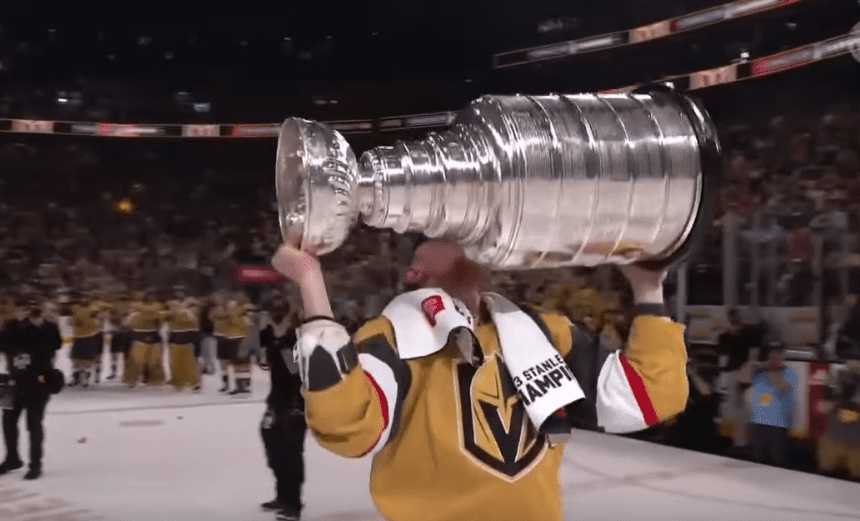Montreal Canadiens
The Montreal Canadiens Can Learn From Vegas’ Stanley Cup

The 2022-23 Stanley Cup has been awarded to the Vegas Golden Knights, and with it comes a few lessons that teams around the league could stand to learn, including the Montreal Canadiens.
Though it may seem like the Golden Knights were gifted a much better roster than most expansion clubs, the truth remains that the actual players chosen at the expansion draft were simply not strong enough to push a team toward a Stanley Cup.
That’s not to say the NHL did not improve the odds Vegas would be able to compete earlier than most expansion clubs, however, the team that won the Stanley Cup only had six expansion players remaining in the lineup.
The trades and agreements that took place during the expansion draft were the first sign that Vegas had a significant advantage over other teams, and not just because they were the only franchise working without a long list of unforced errors over the last decade.
Players like Jonathan Marchessault and Riley Smith made their way to Vegas due to general managers such as Dave Tallon attempting to protect overrated defencemen such as Alex Petrovic and Mark Pysyk.
Such trades were a result of general managers inflating the value of their ‘glue’ players while gleefully sacrificing talented players at the altar of the expansion draft.
Draft Shmaft
Drafting and developing a talented roster has long been considered the only way to build a contending line in the NHL, and for good reason, too.
But Vegas proved that in some cases, there’s another way.
In fact, Nicolas Hague is the only player who dressed in the last game of the Stanley Cup final for the Golden Knights that was actually chosen by the team at an Entry Draft.
11 of their players, including the majority of their most talented skaters, were acquired via trades.
Players such as Jack Eichel, Mark Stone, and Chandler Stephenson.
Vegas acquired Stone from the Ottawa Senators for Erik Brannstrom, Oscar Lindberg, and a second-round pick, which is the lunchtime equivalent of trading a damp baggy containing six broken crackers for a slice of birthday cake.
The same can be said about the Stephenson trade, who was unceremoniously traded from the Washington Capitals in exchange for a fifth-round pick, the type of robbery that would have made John Dillinger jealous.
Yes, it’s important to draft talented players such as Stone and Stevenson, but when teams are giving away the players they spent years developing for pennies on the dollar, why bother taking the slow and steady approach?
Spending Money Where It Counts
The Golden Knights paid a handsome fee for Eichel, to the tune of Alex Tuch, Peyton Krebs, and a first-round pick.
However, you’d be hard-pressed to argue it wasn’t an excellent trade, and not only because it was a significant reason why the team won their first Stanley Cup.
Jack Eichel, Stanley Cup Champion. pic.twitter.com/XSogxJ31RF
— Marc Dumont (@MarcPDumont) June 14, 2023
While many franchises pointed to their longtime problems that were seemingly impossible to solve, the Golden Knights identified a glaring issue, their lack of a bonafide No.1 centre, and quickly addressed it.
They did not invest heavily in a goaltender, using five different netminders throughout the season.
They also ensured they had enough star players to power a run to the Stanley Cup, which is one of the most important factors for a successful team.
Don't assume you're a contender until you have at least 4 legitimate star producers on your team.
10 of the last 11 Cup Winners had 4 or more.
8 of the last 11 Cup Winners had 5 or more. pic.twitter.com/4lhEaTEXjS
— Byron Bader (@ByronMBader) June 14, 2023
Copycat League
The Canadiens cannot emulate every action taken by the Golden Knights on their way to a Stanley Cup, but they can use parts of the formula to fast forward their action plan.
Vegas didn’t win the Stanley Cup by making the right decision every time.
Two of their biggest mistakes involved the Montreal Canadiens.
The first being when they traded Tomas Tatar to the Habs along with a second-round pick and a certain prospect named Nick Suzuki.
The second was when they signed Pacioretty for roughly 8 percent of their salary cap.
But they did not dwell on their mistakes, as evidenced by the poor return they received from the Carolina Hurricanes for Pacioretty in a desperate attempt to create some financial flexibility.
Much to the chagrin of many longtime hockey fans, Vegas also took advantage of the salary cap loopholes made available by the league. And while there’s certainly a debate to be had regarding the rules, any team not doing their best to capitalize on the current setup is simply not doing everything in their power to win.
In a league where most general managers look to mitigate mistakes rather than attempting bold moves to improve their clubs, an aggressive approach has served the Golden Knights well.
But it wasn’t just a matter of one team becoming the living embodiment of the saying ‘go big or go home’.
The approach taken by Vegas reminded us all that the traditional method of building a Stanley Cup-winning roster is not the only road to success, a lesson the Canadiens should keep in mind as they attempt to create a roster worthy of Lord Stanley’s Gail.










